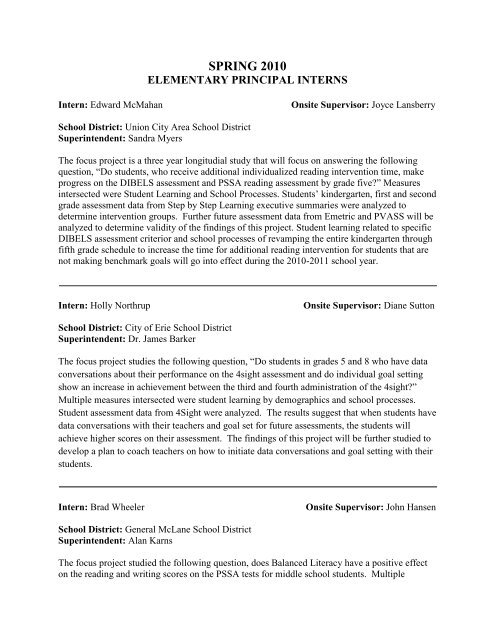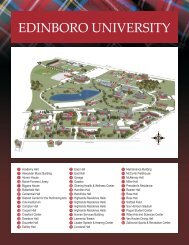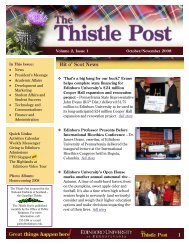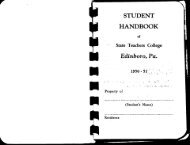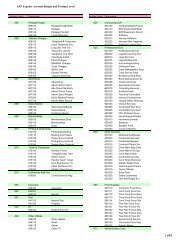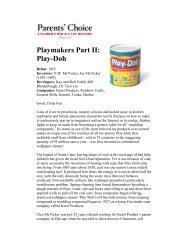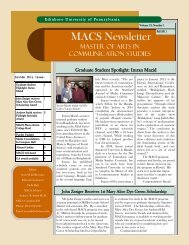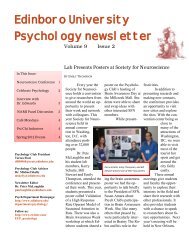SPRING 2010 - Edinboro University
SPRING 2010 - Edinboro University
SPRING 2010 - Edinboro University
You also want an ePaper? Increase the reach of your titles
YUMPU automatically turns print PDFs into web optimized ePapers that Google loves.
<strong>SPRING</strong> <strong>2010</strong><br />
ELEMENTARY PRINCIPAL INTERNS<br />
Intern: Edward McMahan Onsite Supervisor: Joyce Lansberry<br />
School District: Union City Area School District<br />
Superintendent: Sandra Myers<br />
The focus project is a three year longitudial study that will focus on answering the following<br />
question, “Do students, who receive additional individualized reading intervention time, make<br />
progress on the DIBELS assessment and PSSA reading assessment by grade five?” Measures<br />
intersected were Student Learning and School Processes. Students’ kindergarten, first and second<br />
grade assessment data from Step by Step Learning executive summaries were analyzed to<br />
determine intervention groups. Further future assessment data from Emetric and PVASS will be<br />
analyzed to determine validity of the findings of this project. Student learning related to specific<br />
DIBELS assessment criterior and school processes of revamping the entire kindergarten through<br />
fifth grade schedule to increase the time for additional reading intervention for students that are<br />
not making benchmark goals will go into effect during the <strong>2010</strong>-2011 school year.<br />
Intern: Holly Northrup Onsite Supervisor: Diane Sutton<br />
School District: City of Erie School District<br />
Superintendent: Dr. James Barker<br />
The focus project studies the following question, “Do students in grades 5 and 8 who have data<br />
conversations about their performance on the 4sight assessment and do individual goal setting<br />
show an increase in achievement between the third and fourth administration of the 4sight?”<br />
Multiple measures intersected were student learning by demographics and school processes.<br />
Student assessment data from 4Sight were analyzed. The results suggest that when students have<br />
data conversations with their teachers and goal set for future assessments, the students will<br />
achieve higher scores on their assessment. The findings of this project will be further studied to<br />
develop a plan to coach teachers on how to initiate data conversations and goal setting with their<br />
students.<br />
Intern: Brad Wheeler Onsite Supervisor: John Hansen<br />
School District: General McLane School District<br />
Superintendent: Alan Karns<br />
The focus project studied the following question, does Balanced Literacy have a positive effect<br />
on the reading and writing scores on the PSSA tests for middle school students. Multiple
measures intersected were Student Learning by School Processes by Demographics. The current<br />
5 th graders at Parker Middle School have been taught using Balanced Literacy, while the current<br />
8 th graders have not. The effectiveness of the Balanced Literacy program at the school was<br />
questioned. A study will be conducted to take a first look at the current results of each class on<br />
their PSSA scores. An initial determination will be derived to indicate whether or not the<br />
students at Parker Middle School exhibit higher Reading and Writing scores on the PSSA tests<br />
after they have used Balanced Literacy.<br />
Intern: Matthew Siembida Onsite Supervisor: Dr. James Ruby<br />
School District: Franklin Area School District<br />
Superintendent: Ron Paranick<br />
The focus project studied the following question, does differentiated reading instruction have a<br />
positive effect on the comprehension and level of fluency as assessed by the 4site, PSSA tests,<br />
and DIBELS assessments. The third and forth grade students have received or are receiving<br />
differentiated reading instruction while the fifth and sixth graders have not. The effectiveness of<br />
this program has been questioned year after year by different administrators within the district.<br />
A study will be conducted to inspect the current results on the 4site and DIBELS results for each<br />
grade, as well as random grades from around the district with a comparable demographic.<br />
Intern: Michelle Verga Onsite Supervisor: Darla Posney<br />
School District: Pennsylvania Virtual Charter School<br />
Superintendent: Dr. Joanne Barnett<br />
The focus project studied the following question, “Do 5 th grade students who participate in the<br />
small group, online novel discussions show a higher level of achievement on the 5 th grade PSSA<br />
Reading than students who read the novels asynchronously?” Multiple measures intersected<br />
were Student Learning by School Processes by Demographics. 2009 student assessment data<br />
from eMetric and Study Island were analyzed and compared to Study Island data from <strong>2010</strong> to<br />
predict <strong>2010</strong> PSSA results. The results suggest that students who participate in the online novel<br />
discussions show a higher level of achievement on the 5 th grade PSSA Reading. School<br />
processes will be further studied to develop a plan to require all 5 th grade students to engage in<br />
small group, online novel discussions.
Intern: Vivian Demko Onsite Supervisor: Roseria Frey<br />
School District: Saucon Valley School District<br />
Superintendent: Dr. Sandra Fellin<br />
The focus project studied the following question, “What area of achievement is showing greater<br />
growth using Fast ForWord with at-risk students?” Multiple measures intersected were Student<br />
Learning by School Processes. Student assessment data from DIBELS, PVAAS, 4Sight and<br />
Quarterlies were analyzed. The most at-risk students in First Grade have shown growth in<br />
Accuracy; in Second Grade Comprehension; in 3 rd Grade Fluency and Accuracy; in 4 th Grade<br />
Fluency, Accuracy, Quarterlies and 4Sight. At-risk students in First Grade have shown growth<br />
in Phoneme Segmentation Fluency; Third Grade in Quarterlies; 4 th Grade in Quarterlies. School<br />
processes relating to the use of Fast ForWord should be further analyzed after students spend<br />
additional time working with the program.<br />
Intern: Melissa McMullen Onsite Supervisor: Sr. Mark Plescher<br />
School District: Diocese of Altoona-Johnstown<br />
Superintendent: Sr. Donna Marie Leiden<br />
The focus project will study the following question, “Do students who have near-perfect<br />
attendance records achieve at a higher rate than students with excessive absences and tardiness?”<br />
Multiple measures intersected were student learning with attendance. The reason for the study is<br />
because teachers identified certain students with high absences/tardiness. A study will be<br />
conducted to review scores on Iowa Test of Basic Skills, DIBELS scores and classroom grades.<br />
The study will review reading, mathematics, language arts, and spelling. Preliminary data show<br />
that several students with excessive absences have lower scores than classmates. More study<br />
will be done to determine if this trend is accurate across grade levels, and a plan will be<br />
developed to draw attention to importance of attendance.<br />
Intern: Steven Kray Onsite Supervisor: Steve Candela<br />
School District: Geneva Area City School District<br />
Superintendent: Mary Zappitelli<br />
The purpose of this study was to analyze the effectiveness of our after school Standards Based<br />
Instruction Program. Our school district has been working hard to develop a working<br />
relationship with all of our struggling students. The entire learning community is working to help<br />
these students be more successful in the classroom. The data collected during this study will be<br />
presented to our staff and we will show the value and importance of this after school program.<br />
Throughout this study, we monitored students in various sub groups. We analyzed their 2009<br />
OAT scores as well as the data that has been gathered through our Think-Link assessments and
theme tests in reading. The results of this study will hopefully prove the effectiveness of this<br />
program and will help us continue this program in the years to come.<br />
Intern: Brian McCall Onsite Supervisor: Marcia deKramer<br />
School District: Conneaut School District<br />
Superintendent: Wendy Szallay<br />
The focus project studied the following question, “Do third through sixth graders from homes<br />
with one or no biological parent perform lower on the PSSA than students from homes with both<br />
biological parents in the household? Does gender or school transfer have any affect on scores as<br />
well?” Multiple measures intersected were Student Learning by Demographics. Student<br />
assessment data were collected from pervious PSSA Math and Reading scores, PVAAS, and<br />
family structure were noted. Results suggest that students from homes with one or no biological<br />
parent score lower on the PSSA. The results will indicate that these groups need intensive<br />
instruction to ensure achievement on PSSA tests in the future.<br />
Intern: Charletta Zeigler Onsite Supervisor: Dr. Arlene Holtz<br />
School District: West Oak Lane Charter School<br />
Superintendent: Dr. Deberra Peoples-Lee<br />
The focus project studied the following question, “Do students in grade four who use a specific<br />
reading comprehension and test taking strategy demonstrate a higher level of achievement on the<br />
PSSA reading than fourth graders in previous years that have not used a specific strategy?”<br />
Multiple measures intersected were student learning, by school processes, by demographics.<br />
Student assessment data from eMetric and Study Island Benchmark tests were analyzed. The<br />
results suggest that students who use a specific reading comprehension and test taking strategy<br />
show higher achievement on the reading PSSA. School processes and demographics will be<br />
further studied to develop a plan for all students to use the reading strategy.<br />
Intern: Denise Pollard Onsite Supervisor: Marcia deKramer<br />
School District: Conneaut School District<br />
Superintendent: Wendy Szallay<br />
The focus project studied the following question, “Do fifth grade students who are<br />
homogeneously grouped for reading show significant gains in reading achievement?” Multiple<br />
measures intersected were Student Learning by School Processes by Demographics. Student<br />
assessment data were collected from previous PSSA reading scores on PVAAS and fifth grade
4Sight reading data. The results suggest that fifth grade students who are homogeneously<br />
grouped for reading do not show a significantly higher level of achievement. School processes<br />
relating to homogeneous grouping by reading ability will be further examined if this grouping is<br />
to be used again, regardless of grade level, when PSSA reading performance lags.<br />
Intern: Sandra Wilson Onsite Supervisor: Michael Smith<br />
School District: Newport School District<br />
Superintendent: Lori Gallagher/Joe Stroup<br />
The focus project studied the following question, “Do teachers’ perceptions of data affect student<br />
achievement on 4Sight Assessments for students in third, fourth, and fifth grade?” Multiple<br />
measures intersected were Student Learning by School Processes by Demographics by<br />
Perceptions. Student assessment data from 4Sight were analyzed in Performance Tracker. The<br />
results suggest that teachers’ perceptions of data had a positive correlation to student<br />
achievement. School processes relating to data usage will be further analyzed to develop a plan<br />
to have teachers consistently use data to impact school processes and student achievement.<br />
Intern: Kimberly Smith Onsite Supervisor: Michael Smith<br />
School District: Newport School District<br />
Superintendent: Lori Gallagher/Joe Stroup<br />
The focus project studied the following question, “Do students in grades four and five with better<br />
attitudes toward academic reading show higher levels of achievement on fourth and fifth grade<br />
4sights than students with poor attitudes toward academic reading?” Multiple measures<br />
intersected were student learning by student perceptions by demographics. Student assessment<br />
data from 4Sight assessments in reading and the Elementary Reading Attitude Survey were<br />
analyzed. Results indicate that students’ attitudes toward reading are a central factor affecting<br />
reading performance. School processes will be further studied to monitor their attitudinal impact<br />
on fourth and fifth grade students toward reading to improve our reading instruction in these<br />
grade levels.<br />
Intern: Brian Ursone Onsite Supervisor: Steve Piasecki<br />
School District: Garnet Valley School District<br />
Superintendent: Dr. Michael Christian<br />
The focus project studied the following question, “Do students who participate in the reading<br />
remediation program show a higher level of achievement on the 5 th grade PSSA Reading than
their own 4 th grade PSSA reading scores, which did not include remediation?” Multiple measures<br />
intersected were Student Learning by School Processes. Student assessment data from eMetric,<br />
100 Book Challenge, GRADE, classroom assessments, and Kidbiz were analyzed. The results<br />
suggest that students who are included in the 5 th grade remediation show a higher level of<br />
achievement on the 5 th grade PSSA Reading. School processes relating to the language arts<br />
curriculum and student learning will be further studied to develop a plan to have a similar<br />
remediation program incorporated into the curriculum prior to grade 5.<br />
Intern: Andrea Root Onsite Supervisor: Matt Patterson<br />
School District: Corry Area School District<br />
Superintendent: Dr. Brian Dougherty<br />
The focus project question studied was, “Do students in grades 3 rd through 5 th , who received<br />
intervention in reading and math throughout the 2008-2009 school year, show a higher level of<br />
achievement on the Scantron and the Pennsylvania System of School Assessment than students<br />
who did not receive intervention during the school year?” Multiple measures of intersections<br />
analyzed were Student Learning by Demographics, School Process, and Perceptions. Scantron,<br />
DRC, and DRA student assessment data was analyzed. The results suggest that students who did<br />
receive interventions showed a moderate level of achievement on the Scantron and PSSA<br />
compared to students who did not receive interventions. School processes related to interventions<br />
will be further analyzed to identify which students would benefit from intervention.<br />
Intern: David Robins Onsite Supervisor: Tony Simone<br />
School District: Anglo American School of Moscow<br />
Superintendent: Drew Alexander, Director<br />
The focus project studied the following question, “Is there a need to revise the currently adopted<br />
standards and benchmarks for mathematics at Grade 4 at Anglo American School (AAS)?”<br />
Multiple measures intersected were Student Learning by School Process by Demographics.<br />
Student assessment data from the Fall 2009 administration of the Measures of Academic<br />
Progress (MAP) test at AAS for Grade 5, relative to the Northwest Evaluation Association<br />
(NWEA) normative population, were analyzed. The results suggest that that AAS students<br />
performing within the median range have a higher frequency of sub-RIT performance in the<br />
Algebraic Concepts goal strand. School processes relating to the math curriculum will be further<br />
studied in order to improve student learning and performance in this strand.
Intern: Jonathan Frye Onsite Supervisor: Tamara Clark<br />
School District: Crawford Central School District<br />
Superintendent: Michael Dolecki<br />
The purpose of this study is to investigate whether students in kindergarten and grade 1 whose<br />
parents attended an educational intervention night at Second District Elementary School have a<br />
higher level of reading fluency than students whose parents did not attend. Baseline data will be<br />
found in the DIBELS reading test administered in November for both groups. The data will<br />
suggest that students whose parents attend educational interventions show growth on DIBELS<br />
reading tests over the course of a school year.<br />
Intern: Craig Stage Onsite Supervisor: Dennis Smith<br />
School District: Northern Tioga School District<br />
Superintendent: Dr. Timothy Bowers<br />
The focus project will study the following question, “Have students in 5 th and 6 th grade who<br />
participated in the after school Study Island based reading tutorial shown improved PSSA<br />
reading scores?” Multiple measures intersected were student learning by school processes and<br />
demographics. Data taken from Performance tracker (4sight, PSSA) and Study Island were<br />
analyzed. Initial data indicate that students who voluntarily participated in the after school<br />
programs have increased PSSA reading scores. School processes relating to Study Island and its<br />
use in an after school tutoring program will be further studied to develop a plan to implement in<br />
similar tutorials in the grades 3 and 4 to improve PSSA reading scores.<br />
Intern: Lora Lutz Onsite Supervisor: Patrick McClintock-Comeaux<br />
School District: Mt. Lebanon School District<br />
Superintendent: Dr. Timothy Steinhauer<br />
This focus project will study the following question, “Do fifth graders that participate in small<br />
groups that focus on specific skills in Language Arts improve their Reading RIT on the third<br />
MAP (Measure in Academic Progress) test of the year?” Student assessment data from eMetric,<br />
PVASS, PSSA testing, and previous MAP data were analyzed to create focus groups. The<br />
results suggest that the fifth grade students that participate in small focus groups improve their<br />
Reading RIT scores on the May MAP test. School processes in Reading instruction in third and<br />
fourth grade will be further studied to help identify students that would benefit from small group<br />
instruction and help to develop a plan to create small group instruction possibilities for those<br />
students in third and fourth grade with the goal of raising their Reading RIT scores on the MAP<br />
test.
Intern: John Szolek Onsite Supervisor: Herb Basham<br />
School District: Slippery Rock Area School District<br />
Superintendent: Dr. Kathleen Nogay<br />
The focus project examined the following question, “Did participation in an after-school tutoring<br />
program by elementary special education students have a positive impact on achievement<br />
scores?” Multiple measures intersected were student learning by school processes by<br />
demographics. Student achievement data from 4-Sight and OnHand Schools were analyzed.<br />
The data for those special education students who participate in the tutoring program was<br />
compared to achievement data for special education students who do not participate in afterschool<br />
tutoring. The results suggest that the after-school tutoring program is having a positive<br />
impact on student achievement. The tutoring program will be studied further to determine if all<br />
special education students would benefit from participation.<br />
Intern: Katherine Bacher Onsite Supervisor: Connie Godin<br />
School District: Moshannon Valley School District<br />
Superintendent: Cheryl Pataky<br />
The focus project studied the following question, “Does after school tutoring improve lasting<br />
student achievement?” Multiple measures intersected were Student Learning by School<br />
Processes by Demographics. Student assessment data from Sylvan, Dibels, eMetric, PVASS, 4-<br />
Sight and PSSA were analyzed. The results suggest that students who participated in after<br />
school tutoring in elementary school were likely to show some improvement in achievement, but<br />
were still achieving below expectations and grade level. This after school program is to be<br />
reevaluated to determine if there is a more effective way to provide lasting student achievement<br />
and positively impact student success.<br />
Intern: Kim Presta Onsite Supervisor: Jon Colinear<br />
School District: Millcreek Township School District<br />
Superintendent: Dr. Frank Bova<br />
Do Belle Valley fifth grade students who receive Title I support show greater growth on the<br />
Fountas and Pinnell Reading Assessment than students who do not receive Title support?
SECONDARY PRINCIPAL INTERNS<br />
Intern: Nicole Boyce Onsite Supervisor: Doug Wilson<br />
School District: PENNCREST School District<br />
Superintendent: Richard Borchilo<br />
The focus project studied the following question, “Do students in grade 8 who feel as if they<br />
have been bullied show a lower level of achievement on their 7 th grade PSSA Reading and Math<br />
scores?” Multiple measures intersected were student perspectives by school processes by<br />
demographics. Student perspective data was collected through the use of an online survey.<br />
Student assessment data from eMetric and PVAAS was analyzed. The results suggest that<br />
bullying does not have an effect on the regular education students’ PSSA scores, but the effects<br />
of bullying may affect the learning support students’ PSSA achievement level. School processes<br />
relating to the Olweus bullying program, the results from a student survey, and the results of the<br />
2009 PSSA’s will be further studied to develop a plan to help the learning support staff support<br />
their students and their thoughts about bullying.<br />
Intern: Andrea Root Onsite Supervisor: Kelly Cragg<br />
School District: Corry Area School District<br />
Superintendent: Dr. Brian Dougherty<br />
The focus project question studied was, “How does student performance on the 11th grade<br />
Scantron test compare with student performance on the 11th grade Pennsylvania System of<br />
School Assessment (PSSA) Reading and Math?” Multiple measures intersected were Student<br />
Learning by Demographics and by School Process. Student assessment data from Scantron and<br />
Data Recognition Corporation were analyzed. The accuracy rate of the students who took the<br />
Scantron test predicted a 64% accuracy rate on how the student would perform on the PSSA.<br />
School processes related to the use of the Scantron test will be further analyzed to develop a plan<br />
on how Scantron can be better utilized to further educate students in the classroom.<br />
Intern: Jennifer Edgar Onsite Supervisor: Bill Rogers<br />
School District: Newburg Public Schools<br />
Superintendent: Paula Radich<br />
The focus project studied the following question, “What factors contribute to the attendance<br />
trends of at-risk students, and what interventions do and could impact their attendance in a<br />
positive manner?” Multiple measures intersected were Student Learning by School Processes by<br />
Demographics. Student assessment data from Pentamation, an anonymous Zoomerang student<br />
survey about attendance were analyzed. The results suggest that, on average, a student’s average
attendance increases by 20% when they transfer from the main high school to our alternative<br />
program. The implementation of a breakfast incentive program has been put into place, and at<br />
the end of the quarter, the data will be analyzed to see if it helped improve attendance.<br />
Demographics and day of the week attendance averages will be analyzed at the end of the quarter<br />
to look for patterns, and a plan to continue increasing ADM will be created based off of the<br />
findings.<br />
Intern: Louis Dalessandro Onsite Supervisor: Raymond Omer<br />
School District: Sharon City School District<br />
Superintendent: John J. Sarandrea<br />
Students with IEPs will be identified. Any IEP subgroups will be identified for the 2007-2008,<br />
2008-2009, and 2009-<strong>2010</strong> school years. Data collected from 2007-2008 and 2008-2009 will<br />
assist in predicting the PSSA outcomes for the 2009-<strong>2010</strong> school year. A predicted IEP<br />
subgroup for 2009-<strong>2010</strong> school year, indicates that the group will fall short of making AYP.<br />
Intern: Daniel Svirbly Onsite Supervisor: Michael Krol<br />
School District: Laurel School District<br />
Superintendent: Dr. Sandra Hennon<br />
This paper outlines the research of how properly developed and delivered remediation programs<br />
effect 11 th grade PSSA mathematics scores. The PSSA mathematics scores of five high schools<br />
with similar student populations and demographics were collected from the PDE website over<br />
the last four years. Each school was also surveyed to collect data describing their remediation<br />
program in terms of who teaches it, how long it lasts, and the materials utilized. A target school<br />
was selected to track the progress of fifteen juniors as they complete three benchmark<br />
assessments periodically through the year, as well as a remediation course. The data was<br />
collected, analyzed, and compared and the findings and implications will be discussed in the<br />
following pages.<br />
Intern: Kenneth Veihdeffer Onsite Supervisor: Kevin Wallace<br />
School District: Clearfield Area School District<br />
Superintendent: Dr. Richard Makin<br />
The focus project studied the following question: “Did 10th grade (2009-10) students, identified<br />
in the subgroups "below proficient" and "proficient" show greater improvement on 4Sight tests<br />
after remediation, and exposure to Best Teaching Practices, than they did during the 2008-09
school year when they were in 9th grade?” Multiple measures intersected were Student Learning<br />
with School Processes. Student assessment data from 4Sight were analyzed. The results suggest<br />
that 10th grade students who are exposed to newly implemented remediation methods and Best<br />
Teaching Practices demonstrate a greater gain on 4Sight tests than they did during the 2008-09<br />
school year when they were in 9th grade.<br />
Intern: Sandralee Kozlowski Onsite Supervisor: Stephanie Keebler<br />
School District: Titusville Area School District<br />
Superintendent: Karen Jez<br />
The focus project studied and compared economically disadvantaged (ED) students in 9 th thru<br />
12 th grades academically to non-economically disadvantaged (Non-ED) students and how those<br />
ED students who did well on the PSSA assessment behave or achieve in the classroom?. The<br />
Pennsylvania State System assessment (PSSA) and eMetric data were used. Of all students<br />
who are proficient/advanced on the PSSA, how do they perform/behave in the classroom?<br />
(Intersections: Student Learning with School Processes and Demographics). Hypotheses given<br />
suggest that ED students perform and participate lower than non-ED students. School processes<br />
will be further studied to develop a plan to address the achievement gap and increase student<br />
engagement.<br />
Intern: Dayna Fusco Onsite Supervisor: Michael Cook<br />
School District: Sheffield – Sheffield Lake School District<br />
Superintendent: Dr. Will Folger<br />
The focus project studied the following question, “Are all of the Math Ohio Achievement<br />
Assessment (OAA) grade level power indicators being targeted by teachers and when are they<br />
being introduced through mastery?” Multiple measures intersected were student learning by<br />
school processes and perceptions. Curriculum data from the Ohio Department of Education<br />
(ODE) state level standards, teacher questionnaire/survey, professional learning community<br />
(discussions via Ning web site) and departmental curriculum maps. The results suggest that<br />
teachers are not introducing the correct grade level math standards and following through with<br />
appropriate mastery assessments. Results from teacher questionnaire/survey, discussion groups<br />
and state wide standards will be further studied to develop a plan for the creation of new<br />
departmental curriculum maps.
Intern: Beth Redfield Onsite Supervisor: Christopher McNell<br />
School District:<br />
Superintendent: Dr. Robert Olzak<br />
The focus project studied the following questions: Are all of the New York State Learning<br />
Standards being addressed and implemented within the Big Picture “project based learning<br />
method?’ and How are the tenth grade students meeting requirements and performance<br />
indicators for the Gateway process into eleventh grade? Multiple measures intersected were<br />
student learning by school processes and perceptions and by student demographics. Curriculum<br />
data from the New York State Department of Education and Big Picture learning indicators were<br />
analyzed, along with teacher input from discussions. The results suggest that teachers may not<br />
be implementing all of the standards into the project based learning methods and that some tenth<br />
grade students are not meeting Gateway requirements. Results from statewide standards, NY<br />
State Regents exams, teacher’s discussions, and Big Picture learning indicators will be further<br />
studied to develop a plan to implement the state standards into the project based learning method<br />
across all curricular areas to achieve student success.<br />
Intern: Michelle Morris Onsite Supervisor: Joseph Torok<br />
School District: Reynolds School District<br />
Superintendent: Joseph Neuch<br />
The focus project studied the question, “Does the scheduling of the Music 7 course affect student<br />
scores on standardized mathematics tests?” Multiple measures intersected were Student<br />
Learning by School Processes by Demographics. Student assessment and demographic data<br />
from eMetric, PVASS, and OnHand Schools were analyzed. The results suggest that students,<br />
including those in the economically disadvantaged subgroup, who are scheduled for the course<br />
during the third quarter, during which time the PSSA is administered, have the highest<br />
percentage of scorers in the advanced level and lowest percentage of scorers in the below basic<br />
level of any quarter. Student scores and demographics will be further studied to see if this trend<br />
occurs in other tests and if any effect is sustained.<br />
Intern: Ryan Yates Onsite Supervisor: Thomas Shirey<br />
School District: Highlands School District<br />
Superintendent: Dr. Louis Baldassare<br />
The focus project studied the following question, “Does providing math study skills classes to 9 th<br />
grade students, who scored basic or below basic on the 2009, Grade 8 PSSA Math Assessment,<br />
help students to achieve a grade of 70% or higher in Algebra 1?” Multiple measures intersected<br />
include 2009; Grade 8 PSSA Math scores, student attendance, 4Sites Math Test scores, math
study skills class walkthroughs, and nine weeks grades. Research suggests that students who are<br />
assigned math study skills class show higher levels of achievement in Algebra 1, ultimately<br />
leading to increased Grade 11 PSSA Math scores. School processes relating to Math study<br />
skills curriculum and scheduling will be further studied to ultimately improve student PSSA<br />
Math scores.<br />
Intern: David Wolfe Onsite Supervisor: Marc Budd<br />
School District: Port Allegany Area School District<br />
Superintendent: Tony Flint<br />
The focus project studied the following question, “Do students who participate in the<br />
FastForWord program score higher on weekly AimsWeb reading probes as compared to students<br />
who do not receive the FastForWord intervention? Multiple measures used to determine student<br />
eligibility were the 6 th grade PSSA and 7 th grade 4sight assessments. The results will be analyzed<br />
upon student completion of 9 weeks of the intervention. Successful completion of the<br />
intervention will trigger the planning for a formation of a school wide intervention.<br />
Intern: Leslie Melquist Onsite Supervisor: Joe Yelich<br />
School District: Jamestown Public Schools<br />
Superintendent: Daniel Kathman<br />
The focus project studied the following question, “Do 10 th -12 th grade special education students<br />
with multiple disciplinary infractions within a single year, have a higher failure rate on NYS<br />
Standardized Tests, than special education students who have not had multiple disciplinary<br />
infractions?” (Multiple measures intersected were Student Learning with School Processes and<br />
Demographics.) Student assessment data from PowerSchool and nySTART were analyzed. The<br />
results suggest that 10 th -12 th grade special education students with multiple disciplinary<br />
infractions within a single year, do not have a higher failure rate on NYS Standardized Tests.<br />
School processes relating to NYS Standardized Tests and student demographics will be<br />
examined further to develop a plan to have special education students serve disciplinary time<br />
with certified teachers to increase student achievement.
Intern: Laurie Alberti Onsite Supervisor: Jason Thomson<br />
School District: Franklin Central School District<br />
Superintendent: Gordon Daniels<br />
The focus project studied the following question, “Do students who participate in a Pre-K to 3 rd<br />
grade 100 Book Challenge Reading Program show a higher level of achievement on the 4 th grade<br />
New York State ELA tests?” Multiple measures intersected were Student Learning by School<br />
Processes and demographics. Student assessment data from New York State provided to<br />
Broome-Tioga BOCES were analyzed. The results suggest that students who participate in the<br />
100 Book Challenge Reading Program demonstrated a higher level of achievement on the 4 th<br />
grade New York State English Language Arts Tests. School process relating to the reading<br />
curriculum and student demographics will be further studied to develop a plan to have all Pre-K<br />
through 3 rd grade students actively participate in the 100 Book Challenge Reading Program.<br />
Intern: Jennifer Martino Onsite Supervisor: Dr. Tom Butler<br />
School District: Ridgway Area School District<br />
Superintendent: Dr. Thomas Butler<br />
The focus project studied the following question, “Do high school teachers who take part in a<br />
Professional Learning Community show a higher understanding of how to incorporate reading<br />
strategies in the content areas? Multiple measures intersected were School Processes and<br />
Perceptions. Both pre-assessment and post-assessment surveys were conducted. The surveys<br />
will exhibit teacher awareness and implementation of reading strategies in the content area<br />
curriculum. The implementation of additional Professional Learning Communities throughout<br />
the High School will be further studied to allow other content area teachers to receive instruction<br />
on implementing reading strategies into their curriculum.<br />
Intern: Jonathon Anderson Onsite Supervisor: Gary K. Elder<br />
School District: Oswayo Valley School District<br />
Superintendent: Robert C. Wicker<br />
The focus project studied the following question, “Does the integration of character curriculum<br />
along with positive reinforcement help increase student achievement when dealing with middle<br />
school students that have high incidences of discipline referrals and low quarterly grade averages<br />
with lower test scores?” The Multiple Measures intersected were Student Processes by School<br />
Learning by Demographics. Student assessment data from eMetric, PVAAS, PSSA, DCR,<br />
teacher grades, and discipline referral records were analyzed. The results suggest a correlation<br />
between lower academic achievement and higher incidences of discipline referrals. School
processes relating to integrating character curriculum and student demographics will be further<br />
studied to develop a plan to reduce discipline referrals and increase student achievement.<br />
Intern: David Swanson Onsite Supervisor: Matthew Pundt<br />
School District: City of Erie School District<br />
Superintendent: Dr. James Barker<br />
The focus project studied the following question, “Are 4sight Math and Reading results an<br />
accurate predictor of PSSA math and reading results for 11 th grade students at an inner city<br />
career and technical school?” Multiple measures intersected were Student Learning by School<br />
Processes by Demographics. Student assessment data from Success for All Foundation and<br />
PSSA scores were analyzed. A sample of students revealed that the predictive value of 4sight<br />
results were 70% accurate. Further analysis will take place to determine the accuracy for the<br />
entire population.<br />
Intern: Toby Marvin Onsite Supervisor:<br />
School District:<br />
Superintendent:
SUPERINTENDENT/SUPERVISOR INTERNS<br />
Intern: Michele Miller Onsite Supervisor: Patrick Kelley<br />
School District: Northwestern School District<br />
Superintendent: Patrick Kelley<br />
The focus project studied the following question, “What variables contribute to an increasing gap<br />
in levels of proficiency on the PSSA Reading among students transitioning from 5th grade in the<br />
elementary school to 6th grade in the middle school?” The intersection of student learning,<br />
utilizing data represented in PVAAS and eMetrics by multiple school processes and<br />
demographics. The results indicate that the demographics are similar in each grade, while the<br />
instruction, assessments, and professional development have varied greatly. A plan was<br />
developed to address the instructional factors contributing to the decline in achievement levels of<br />
6th grade students. In conclusion, additional data and student perceptions for further study were<br />
areas identified for potentially negative effects on student achievement.<br />
Intern: Edward Nientemp Onsite Supervisor: Dr. Marjorie Wallace<br />
School District: Union City Area School District<br />
Superintendent: Sandra Myers<br />
The focus project studied the following question: “Do partnerships between schools and<br />
community based support/social systems assist in decreasing truancy rates and improving student<br />
achievement?” A second question studied is: “Can existing data support the identification of a<br />
specific sub-group that may benefit from extensive therapy to curb the future occurrence of<br />
truancy.” Multiple measures intersected were demographics by school processes by student<br />
learning. Academic achievement reports and school demographic data were used to examine<br />
attendance and student achievement. School district/building data compiled by student support<br />
teams were used to identify specific sub-groups that may benefit from extended or enhanced<br />
outpatient therapy. The data points to success in the reduction of truancy using universal and<br />
targeted interventions in a response to intervention framework and provides implications for<br />
possible intensive individualized interventions for identified students.<br />
Intern: Lindsay Burns Onsite Supervisor: Ron Mancia<br />
School District: Otto Eldred School District<br />
Superintendent: Robert Falk<br />
The focus project studied the following question, “Do 7 th & 8 th grade students who participate in<br />
the reading and math intervention classes show significant gains on the 4-sight assessment, given<br />
4 times a year?” Student assessment data from eMetric, and Success for All were analyzed.
Intersections include Demographics, Teacher Perceptions, School Processes, and Student<br />
Achievement. The results suggest that students who take part in intervention classes show<br />
significant improvement from the baseline 4-sight test. The relationship between 4-sight and<br />
PSSA results will be further analyzed.<br />
Intern: Harold Gabriel Onsite Supervisor: Dr. Jeffrey Namey<br />
School District: Lehman Lake – Lehman School District<br />
Superintendent: James McGovern<br />
The focus project studied the following question, “Do students in 5 th grade show an improvement<br />
in their Academic Achievement with the Success for All Reading Program this school year as<br />
compared to 5 th grade students using Houghton Mifflin Reading Program last year based on<br />
PSSA/4-Sight data?” Multiple measures intersected were student learning by demographics by<br />
perceptions by school processes. Student assessment data was gathered from web tools, 4-Sight<br />
results, e-metric, PVASS and the Success for All Information web site. The results suggest that<br />
the students who are now involved in this program should show higher reading test scores on the<br />
PSSA. School processes will continue through information gathered by the data analysis team,<br />
curriculum review and revision and increased parental involvement for all 5 th grade students to<br />
reach the level of proficient.<br />
Intern: Gary Massaglia Onsite Supervisor: Dr. William Clark<br />
School District: Bald Eagle Area School District<br />
Superintendent: Dr. William Clark<br />
The focus project studied the following question, “What are the performance score trends for<br />
students in grades 3 through 8 on the PSSA exam in reading and math?” The Superintendent and<br />
Assistant Superintendent in the Manheim Central School District have recently been hired and<br />
are unfamiliar with the needs of the students who take the PSSA exams. Since they do not know<br />
what issues they have at this time in the district and need to have a baseline of information from<br />
which to work, I will be focusing on the past two years of PSSA data isolating on the reporting<br />
categories and cohort groups utilizing PVAAS data. With this information they then can begin<br />
to at the issues and design remediation strategies for implementation.
Intern: Christine Holjencin Onsite Supervisor: Clyde D. Moate<br />
School District: Cameron County School District<br />
Superintendent: Clyde D. Moate<br />
The focus project studied the following question, “Do students who are enrolled in a remediation<br />
class show greater gains in benchmark assessment scores and in confidence than students in the<br />
same grade level who are not enrolled in a remediation class?” Multiple measures intersected<br />
were School Processes by Student Learning by Perceptions by Demographics. Student<br />
assessment data from 4Sight, eMetric, PVAAS and student surveys were analyzed. The results<br />
suggest that remediation does better prepare the student for benchmark assessments. School<br />
processes relating to language arts, mathematics and science curricula, student learning,<br />
perceptions, and demographics will be further studied to develop a plan to have all students who<br />
are below proficient on benchmark assessments to be scheduled for appropriate remediation.<br />
Intern: Gretchen Troxell Onsite Supervisor: Deborah Ohmacht<br />
School District: Northampton Area School District<br />
Superintendent: Dr. Linda Firestone<br />
The focus project studied the following question, “Taking 11 th grade students in the subgroup of<br />
those with IEPs, do their proficiency level on the 4 Sight Math Benchmark Test accurately<br />
predict their proficiency level on their PSSA Math Test?” Multiple measures intersected were<br />
Student Learning by School Process by Demographics. Student assessment data from eMetric,<br />
Performance Tracker and Sapphire were analyzed. The results suggest that IEP students who<br />
participate in the 4 Sight Math Benchmark Test taken throughout high school show an<br />
inconsistent level of performance when compared to their proficiency results on the PSSA Math<br />
Test. School processes relating to the math curriculum and student demographics will be further<br />
studied to develop a plan to produce consistent test results.
Intern: Jeff Matty Onsite Supervisor: Gary Hamilton<br />
School District: Ringgold School District<br />
Superintendent: Gary Hamilton<br />
The focus project studied the following question, “Do students who spend additional<br />
instructional time in math due to modified block scheduling improve their scores on the PSSA<br />
Math tests at the middle school level?” Multiple measures intersected were Student Learning by<br />
School Processes by Demographics. Student assessment data from eMetric, PVASS, and 4sight<br />
tests were analyzed. The results provide information that students improved their PSSA scores<br />
in Math during their middle school attendance. The advantages and disadvantages of modified<br />
block scheduling at all grades and subjects will be further studied and district plan<br />
implementation discussed. Student demographics, State standards, and curriculum adjustments<br />
will be examined.<br />
Intern: Marilyn Walters Onsite Supervisor: Wendy Szallay<br />
School District: Conneaut School District<br />
Superintendent: Wendy Szallay<br />
The focus project studied the following question, “Do students who are instructed in leveled<br />
groups, according to DIBLES (Dynamic Indicators of Basic Early Literacy Skills) assessed<br />
benchmarks (Intensive, Strategic, Benchmark) score higher over a period of 1.5 years on<br />
DIBLES assessments than students who are instructed heterogeneously?” Multiple measures<br />
intersected were Student Learning by School Processes by Demographics. Student assessment<br />
data from DIBLES were analyzed on students from School A (N=50) and School B (N=65)<br />
during Kindergarten and the first half of first grade. The results suggest that students who are<br />
instructed heterogeneously by classroom score higher on DIBLES assessments. School<br />
processes relating to reading instruction will be further studied to develop a plan for reading<br />
instruction.
Intern: Sherry Cowburn Onsite Supervisor: Richard Toner<br />
School District: Coudersport Area School District<br />
Superintendent: Richard Toner<br />
The focus project studied the following question, “Do students in grades 3 through 5 who receive<br />
ninety minutes of Language Arts instruction and thirty minutes of intensive tutoring scaffolded<br />
from standardized test results studied in data teaming meetings, show higher levels of student<br />
achievement than students who have not received targeted instruction and tutoring?” Multiple<br />
measures intersected; School Processes by Student Learning by Demographics. PVAAS, PSSA,<br />
4-Sight, and DIBELS data were analyzed. The findings conclude that defined times for<br />
Language Arts instruction and intervention and data teaming using standardized assessment<br />
results have impacted positively the outcome of the PSSA and 4-Sight scores. Further study<br />
includes; core program fidelity, refined flexible grouping/differentiation, and data based<br />
decisions leading to individualized explicit instruction.<br />
Intern: Matthew Sottolano Onsite Supervisor: Dr. Timothy Bowers<br />
School District: Northern Tioga School District<br />
Superintendent: Dr. Timothy Bowers<br />
The focus project studied the following question, “Do students who are assigned to math tutoring<br />
in 7 th and 8 th grade show growth/improvement on the 7 th and 8 th grade math PSSA.” Multiple<br />
measures intersected include 2008 6 th grade PSSA math scores, 2009 7 th grade PSSA math<br />
scores, 2008 7 th grade PSSA math scores, 2009 8 th grade PSSA math scores and student<br />
assessment data from PVASS were analyzed. The results suggest that students who participate in<br />
math tutoring in the 7 th and 8 th grade show growth on their 7 th and 8 th grade math PSSA tests.<br />
School processes relating to math tutoring will be further studied to develop a plan to provide<br />
tutoring at other grade levels to improve overall PSSA math Scores.<br />
Intern: Dr. Jill Earman Onsite Supervisor: Dr. Deborah Clawson<br />
School District: Indiana Area School District<br />
Superintendent: Dr. Deborah Clawson<br />
The question guiding this focus project was: “Do students in grades four through six who<br />
participate in the PSSA Parent Partnership program improve their PSSA scores and perceive that
they are more prepared for the PSSA than students who do not participate?” The intersection of<br />
student learning data (PSSA scores from eMetric), school process data (participation in the<br />
program), and perception data (student surveys) provide a complete picture of the impact of the<br />
PSSA Parent Partnership on student achievement and perceptions. The author supports the best<br />
practices of using a standards-based curriculum and formative assessment as the foundation for<br />
an educational program, but the findings of this study support the use of test preparation<br />
programs that involve parents as well.<br />
Intern: Caron Anthony-Higley Onsite Supervisor: Jan Feleppa<br />
School District: Northwest Tri-County IU5<br />
Superintendent: Dr. Marjorie Wallace, Executive Director<br />
The focus project studied the following question, “Does a direct communication program<br />
implemented in an MDS (Multiple Disabilities Support) classroom improve expressive<br />
communication in nonverbal students?” Multiple measures intersected were teachers’ pre- and<br />
post-perceptions of expressive language in nonverbal students and pre- and post-assessment of<br />
students’ expressive language skills. The results suggest that MDS students who participate in a<br />
direct communication program improve their expressive language skills. A comparison of<br />
student PASA reading scores from 2009 to <strong>2010</strong> will determine if the direct communication<br />
program impacted student achievement in reading.<br />
Intern: Dr. Melanie Kerber Onsite Supervisor: Dr. Fran Serenka<br />
School District: Sto Rox School District<br />
Superintendent: Dr. Fran Serenka<br />
This focus project will answer the question, “Are eleventh grade students who score at basic or<br />
below basic on the 8 th grade PSSA test in a low functioning district with a high rate of poverty,<br />
special education and diversity helped by an infusion of supports including reading and math lab,<br />
PSSA Coach materials, standards aligned curriculum, end of season blitz reviews and<br />
unconditional support raise test scores at the end of their junior year?” Results will be<br />
interpreted from data on the 4Sight, attendance and discipline monitoring, grades, teacher<br />
reports, student survey, student interview and classroom observations to assess engagement and a<br />
review of past PSSA scores. Results will be used as one of multiple tools to drive instruction.


